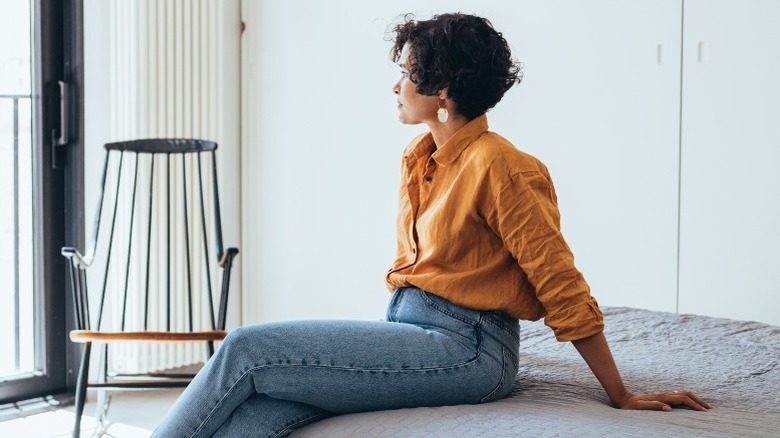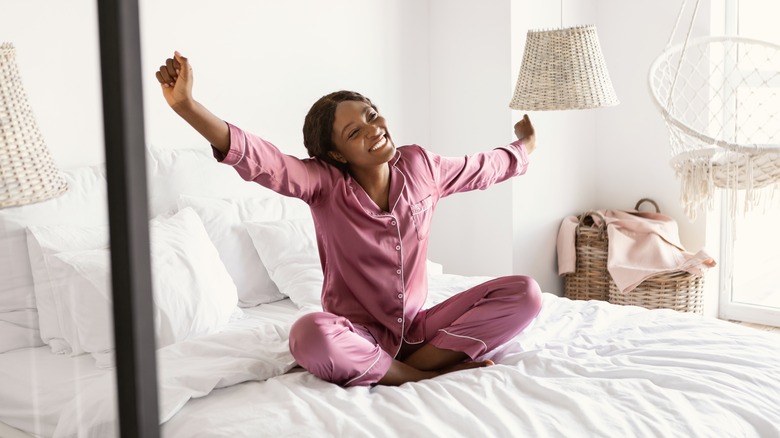Are There Any Health Hazards Linked To Wearing 'Outside Clothes' On Your Bed?
Some days, it's normal to want to sit down and relax as soon as you enter your living space before doing anything else. However, where you decide to take a rest while still wearing "outside clothes" might matter. Sitting on the couch is usually acceptable, but what about your bed? Germs are the ever-present microorganisms that cause disease, and we definitely tend to pick quite a few up when out and about. Therefore, for some, wearing "outside clothes" on your bed is an immediate "no" while others don't see the problem.
We could debate about this topic for days, but the real question is whether it is scientifically safe to wear the clothes you've been in all day in or on your bed. Germaphobes might not find the answer acceptable, but there are actually no serious health hazards linked to wearing your "outside clothes" while lounging at home. While many want to feel clean when hopping into bed, you won't necessarily get sick if you plop down in your jeans.
There are, however, notable exceptions to this rule, as well as ways to lower the risk of catching a disease. Washing your hands should be common sense when coming back home, and if for whatever reason there's no soap or water available, make sure to at least use hand sanitizer. Although it's not a big deal not to change into lounging attire, sometimes "outside clothes" could contribute to health risks.
A healthy immune system should protect you from germs
Despite the fact that some may find it gross, there aren't any serious health hazards linked to wearing your "outside clothes" on your inside furniture, including the bed. While it may seem unlikely that the clothing you've been wearing all day is sanitary enough for bed wear, according to microbiologist Philip Tierno, M.D., it doesn't pose a health risk.
In a conversation with Today, Tierno noted that it's perfectly normal to pick up some germs throughout your usual day — on the subway, in restaurants, at the office — and that germs are impossible to avoid. "Lucky for mankind, if you have a normal, stable immune response, you should be able to protect yourself against them," Tierno says, adding that most transmittable diseases get passed on from person to person by indirect or direct contact rather than sitting on the bed in "outside clothes." This means you're more likely to get sick if somebody infected coughs near you or if you touch something the infected person has recently touched.
"In the infectious disease world, there's uncertainty about the relative importance [of clothing] in the role of transmission," Thomas A. Russo, M.D., an expert in infectious diseases, explained in a conversation with Self. According to Russo, the fibers in our clothes can actually help prevent particles of disease from getting passed on by trapping them to a certain extent. "The pathogens aren't as bioavailable as they are if someone coughs and you breathe it in directly, for example," he explained.
Secondary exposure to pathogens is still possible
However, it is not impossible for our clothes to play a vital role in catching a disease, as Thomas A. Russo, M.D., notes. While the chances are low, there is still a slight possibility of a pathogen finding its way from your clothing or furniture and into your system, which is known as secondary exposure. If you picked up a harmful pathogen while out and then touched the spot where it landed on your clothes for long enough for it to transfer and immediately made contact with your mouth, nose, or eyes, you could get sick, Russo explained to Self.
Still, secondary exposure can be prevented by washing your hands regularly, allergist and immunologist Karen Kaufman, M.D., tells Hunker. Other than personal hygiene, you should be washing your sheets on a regular basis to prevent harboring any allergens, such as pollen, pet hairs, and dust mites, Kaufman notes. "Pollen granules and outdoor mold spores can adhere to our clothing and hair [when we spend time] outdoors. Wearing these clothes to bed could introduce these allergy triggers into your bedding," she elaborated.
While it is safe to chill on your bed in "outside clothes" from time to time, it's probably best if you don't make it a habit. Changing from the clothes you've been wearing all day doesn't require much time or effort, and you're definitely going to be more comfortable wearing loungewear or pajamas when getting into bed.


